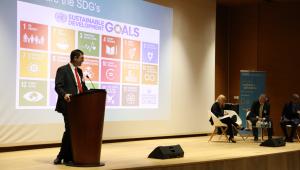The goals, agreed by world leaders at the United Nations last September, set a range of development targets, including poverty reduction, education and governance, to be met by 2030.
In a report published today, the think-tank said that taking urgent, early action within the first three years will make meeting the ambitious targets far more feasible.
Elizabeth Stuart, research fellow at the ODI and an author of the report, said: “We have learned from bitter experience that delaying action will jeopardise our chances of attaining the SDG targets.
“This report sets out just how difficult it will become if governments do not step up to these challenges within the first 1,000 days.”
In sub-Saharan Africa for example, where the scale of the challenge is the greatest, the current rate of progress needs to double to eliminate ultra-poverty – experienced by people living on less than one dollar per day – by 2030.
But this would need to be three times as fast if no action is taken within the first six years, the ODI said.
The same trend can be seen in education. African nations currently need to reduce the number of children attending school for less than four years by 15% each year between now and 2030.
But if nothing is done until 2018, the rate increases to 18% per year, or to 23.5% per year if no action is taken by 2021, the ODI found.
“The evidence shows that achieving the SDGs, and the ambition to leave no one behind, will become far more difficult, the longer governments delay,” the report stated.
The report recognised that delivering results by September 2018 may “seem implausible”, especially for many fragile states and least developed countries.
However it pointed to a number of examples where committed governments, focused on delivering results for those being left behind, have delivered results.
In Senegal, for example, a 2010 project to increase energy access for 191 villages in rural areas saw the number of people with access to electricity increase from 17,000 to 90,000 by 2012.
The ODI also highlighted the introduction of Nepal’s interim constitution in 2007, which formed a legal basis for the rights of minorities and introducing quotas for members of lower castes and women. When the Constituent Assembly, the country’s parliament, was formed one year later, women held one third of the seats.
“Our research shows that it is possible to make the necessary progress. Countries can make extraordinary achievements in just three years,” Stuart said.
The report outlines a “pathway for governments to follow”, explained Stuart, which she said is “achievable so long as action begins now”.
Unlike the SDGs predecessor, the Millennium Development Goals, the SDG targets apply to all countries, not just developing ones.
The ODI’s road map outlines recommendations for action for countries at both low and advanced stages of development, on areas such as health, education, social safety net systems, electricity, discrimination and institutional and legal reform.
It added that throughout the process, governments will also need to make use of data, establish effective financing models, follow principles of good governance, and listen to their marginalised populations when developing their SDG implementation plans.
“Finally, action needs to continue beyond the first 1,000 days,” the ODI stressed, suggesting governments set up rolling ‘stepping stone’ targets every three to five years to ensure enough progress is being made to close the gaps for all groups.
The report was published ahead of the High-level Political Forum on Sustainable Development, the first event to monitor the progress of the SDGs, which takes place in New York later this month.













